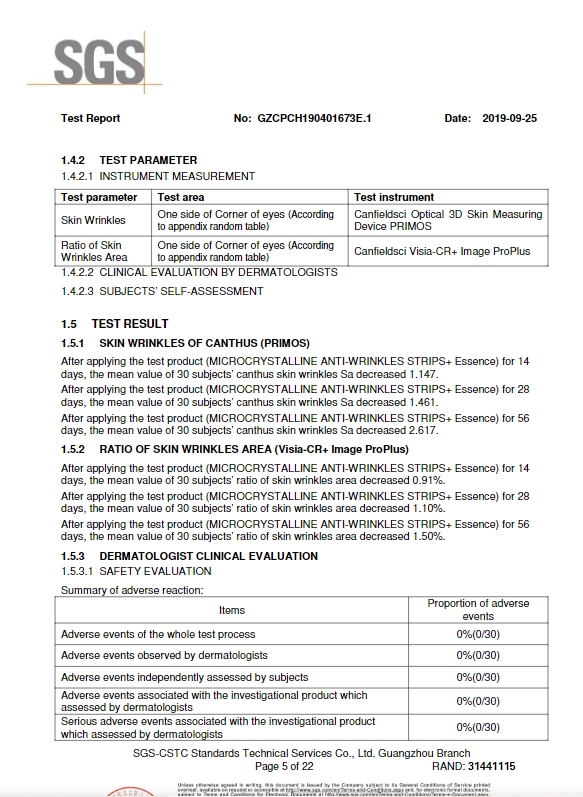Tel.: +86 159 2031 3473
E-mail: manager@onugechina.com
Tel.: +86 159 2031 3473
E-mail: manager@onugechina.com
Collagen is the most abundant protein in the human body. It provides the structural framework for many tissues including skin, muscles, bones, tendons, and ligaments. As we age, collagen production naturally declines leading to common signs of aging like wrinkles, sagging skin, and joint discomfort.
This has led to an explosion in the popularity of collagen supplements and topical products aimed at restoring youthful-looking skin. But what does the science say about whether collagen can help reduce wrinkles and fine lines?
Let’s review the evidence.

Collagen is made up of three amino acids - glycine, proline, and hydroxyproline - wound together in a unique triple helix structure. This gives collagen its strength and flexibility to support tissues throughout the body. There are at least 16 different types of collagen in humans, but collagen wrinkle formula predominantly contains type I which makes up 90% of the body’s collagen and is found largely in skin, bones, tendons, and ligaments.
Collagen is produced by fibroblast cells in the dermis layer of the skin. As we age, collagen production slows down. Fibroblast activity declines. And existing collagen fibers become more disorganized and fragmented. The loss of collagen leads to common signs of aging like wrinkles, sagging skin, thinner skin, and reduced elasticity. Genetics, sun exposure, smoking, poor diet, and other factors can accelerate collagen breakdown even further.
While some collagen loss is inevitable with age, certain lifestyle factors can speed up the process significantly. These include:
● Smoking - Chemicals in smoke have been shown to degrade existing collagen.
● Excessive alcohol - Damages collagen production and skin repair mechanisms.
● High sugar, processed foods - Leads to glycation, interfering with collagen structure.
● Too much sun - UV rays break down collagen fibers and inhibit production.
Avoiding these factors, wearing sunscreen, and eating a healthy diet rich in antioxidants can help slow collagen degradation and support overall skin health.
Collagen is found abundantly in animal bones, skins, tendons, and ligaments. Food sources include:
● Chicken skin
● Beef bone broth
● Fish skin
● Pig knuckles
● Eggshell membranes
Consuming protein-rich foods like fish, beans, eggs, and chicken supports the body’s own collagen production by providing the necessary amino acids. Fruits and vegetables containing vitamin C also help stimulate collagen synthesis.
Collagen supplements have become wildly popular for fighting signs of aging. These provide extra collagen that your body may be lacking. Most research has focused on marine or bovine collagen peptides taken orally at daily doses of 2.5-15 grams.
Some studies show improved skin hydration, elasticity, and reduced wrinkle depth with collagen supplements. However, many studies have been funded by collagen manufacturers, so more independent research is still needed. Talk to your doctor before taking any new supplement.
Evidence suggests collagen supplements may provide these benefits for aging skin:
● Support skin thickness and help prevent thinning of the epidermis
● Improve moisture, hydration, radiance
● Help maintain firm, youthful, elastic skin
● Strengthen fragile, easily damaged skin
● Unable to fully reverse wrinkles or sagging skin
Results are best seen after taking collagen consistently for 8+ weeks. Maximum collagen absorption happens around 90 minutes after ingestion.
Topical products like serums and creams containing collagen are also popular. Some research shows improved skin elasticity and texture when collagen is applied to the skin. However, it’s unclear how much intact collagen can absorb through the outer skin layer.
Due to its larger molecule size, topical collagen likely works better when paired with other ingredients like vitamin C that help drive it deeper into the skin. For optimal results, look for products combining collagen with antioxidants.
Collagen supplements come from various sources and in different forms:
● Anti-wrinkle mask containing collagen ingredients: SecretStrips' anti-wrinkle mask has added effective ingredients such as collagen, which can effectively reduce wrinkles, and we have a special anti-wrinkle report.

● Bovine - From cows or beef parts
● Marine - Derived from fish
● Chicken collagen - From chicken cartilage and eggshells
● Vegans - Plant-based or lab-created collagen builders
Popular ways to take collagen:
● Powders - Add to food, drinks, smoothies. Highest collagen content.
● Capsules or pills - Easy to swallow. Check label for amount of collagen per pill.
● Liquid collagen or beauty shots - Pre-mixed, portable collagen drinks.
● Gummies - Fun, tasty way to get your collagen. Lower amounts per gummy.
Adjust dosage based on your individual needs and goals. Those seeking anti-aging skin benefits should aim for at least 8-12 weeks of daily use.
Pure collagen itself appears very safe for most people with little to no side effects. However, some collagen supplements contain additional ingredients like herbs that could cause issues for some people.
Also, be cautious with formulas containing mega-doses of certain vitamins and minerals which can be unhealthy in excess. As with any supplement, consult your healthcare provider before starting a collagen regimen, especially if pregnant or nursing.
It’s important to note you don’t need to take collagen supplements specifically to maintain healthy collagen levels. Consuming adequate protein along with vitamins C, D, zinc, and calcium gives your body what it needs to produce its collagen.
Aim for at least 0.36 grams of protein per pound of body weight through food sources like fish, poultry, eggs, beans, and Greek yogurt. Pair this with daily physical activity like strength training and you’ll support your body’s collagen and overall health. Think of collagen supplements as extra insurance on top of a healthy lifestyle.
Research suggests several ways collagen may help minimize wrinkles and lines:
● Improves moisture content and hydration of the skin
● Increases collagen density within the dermis layer of skin
● Reduces fragmentation of the collagen network
● Helps thicken the thinning epidermis layer
● Boosts fibroblast activity to produce more collagen and elastin
In multiple studies, participants taking collagen supplements showed significant improvements in skin elasticity, hydration, smoothness, and dermal collagen density compared to placebo groups. Reduced wrinkle depth, length, and frequency were also observed.
Multiple randomized controlled trials have investigated collagen supplements for wrinkle reduction with promising results:
● A study in 72 women over 12 weeks found those taking a collagen complex saw increased skin hydration, elasticity, and density versus placebo. Skin roughness was also reduced.
● A trial in 67 women showed those taking 5 grams of collagen hydrolysate experienced 25% less skin dryness and 27% fewer wrinkles after 8 weeks compared to placebo.
● Another study had women take 2.5 or 5 grams of collagen daily for 8 weeks. Both collagen groups increased skin elasticity versus placebo, with greater effects in older women.
● When 64 women took 1,000 mg of low molecular weight collagen for 12 weeks, skin hydration improved at 6 and 12 weeks compared to placebo. Wrinkle parameters also improved.
While results are encouraging, longer-term studies are still needed to identify ideal collagen sources, doses, and treatment durations for reducing wrinkles. Consistency appears to be key.
Most evidence suggests oral collagen supplements are more effective for minimizing signs of skin aging like wrinkles. Ingestible collagen peptides are absorbed into the bloodstream and distributed throughout the body. Studies show increased collagen fibril density and diameter in the skin after taking oral collagen.
Topical collagen shows better results for improving surface skin texture. But its ability to reach deeper skin layers is limited. For maximum anti-aging benefits, a combination approach of both oral supplements and topical creams with collagen may be ideal. More studies directly comparing oral vs topical collagen are still needed.
Collagen decline is an inevitable part of aging. However preliminary research suggests supplements and topicals can potentially help stave off some collagen loss and improve certain signs of skin aging.
While not a magic bullet, evidence indicates collagen can boost moisture, smoothness, and elasticity while reducing the appearance of fine lines and wrinkles to help achieve a more youthful complexion.
Discover our top-rated collagen wrinkle formulas to help smooth fine lines and reveal radiant, youthful-looking skin. Get exclusive discounts on premium anti-aging collagen face masks, innovative collagen wrinkle formula serums, and more. Contact us today to learn more and revitalize your skin with collagen!
Q: How long does it take for collagen supplements to work?
A: Results are generally seen after 8-12 weeks of consistent daily use. Maximum absorption happens around 90 minutes after taking oral collagen.
Q: When is the best time to take collagen?
A: Most experts recommend taking collagen supplements first thing in the morning on an empty stomach or right before bedtime.
Q: What’s the recommended collagen dosage per day?
A: Research on wrinkle reduction used amounts ranging from 2.5-15 grams daily. Follow dosage instructions from your chosen product.
Q: Does collagen have any side effects?
A: Pure collagen is generally safe with very few reports of adverse effects. However, some supplement blends add herbal extracts or high vitamin doses that could cause reactions.
Q: Can vegans take collagen?
A: Yes, vegan-friendly collagen builders provide amino acids to support the body’s own collagen production without animal sources.
CONTACT WITH SUPPORT TEAM
Navigation
Contact Us
Copyright © Guangzhou Magic Strips Family Bio-Technology Co., Ltd. All Rights Reserved |
Sitemap | Privacy Policy
